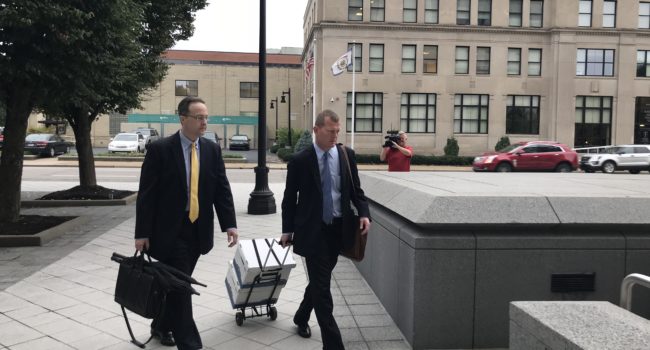CHARLESTON — West Virginia Supreme Court Justice Allen Loughry has continued testimony in his own defense, taking the stand for six hours over parts of two days.
The trial has now gone a full week. Jury selection lasted all day last Tuesday, with opening statements last Wednesday morning.
Loughry’s defense called him to the witness stand on Monday afternoon, and he testified for three hours. Loughry testified for another three hours on Tuesday morning. He was still on the stand when Judge John Copenhaver called for a lunch break.
On Tuesday morning, Loughry responded to detailed questioning by U.S. Attorney Philip Wright, who discussed specifics about Loughry’s travel records and invoices from his book sales.
Most of the 22 counts against Loughry allege that he used state vehicles and state purchasing cards for personal travel.
Wright focused at one point on a Jan. 19, 2014, gas purchase that occurred on a Sunday evening before Martin Luther King Jr. Day. Wright asked, “So you were conducting official court business at 8:17 p.m. on a Sunday of a holiday weekend?”
Loughry responded, “Well, it would require more official explanation if you would like me to do that.”
Referring to a March 23, 2014, gasoline purchase, Wright asked, “You were conducting official business in Kanawha County at 8:58 p.m. on a Sunday evening that required 12.636 gallons of gasoline?”
Loughry responded, “I could explain that if you’d like me to.”
Wright did not accept that offer.
Questioned later by his own attorney, John Carr, Loughry did explain some of his habits.
“Would you always fill the car up before you took it back?” Carr asked.
“I would, yes,” Loughry responded.
Carr also asked again for Loughry to explain some of the reasons behind his travel that had been questioned earlier.
In one instance, a trip to Morgantown, Loughry said he had been heading for a conference in Clarksburg when he got word that his mother had been taken to the hospital. So he diverted to Morgantown to see her.
In another instance, Loughry acknowledged stopping by the wedding for the owner of the company that published his political ethics book. But he said he was also in Tucker County for festivities and a parade in which he had been offered an honorary role.
Prosecutor Wright asked Loughry some questions about a limited liability corporation in the name of Loughry’s wife, Kelly. That company received payments from The Greenbrier Resort for Loughry’s book at $24.49 a copy.
Wright asked Loughry if his joint income tax filing reflected those payments. “You did not list any income or payment from The Greenbrier to your joint checking account?” Wright asked.
Wright also asked Loughry why there was no indication of such payments on the financial report justices file with the Supreme Court to reflect outside sources of income.
None of the counts against Loughry directly reflect allegations about payments for the books, although some of the charges having to do with Loughry’s travel result from his trips to The Greenbrier for book signing events.
Wright also ran Loughry through a timeline of some key events on the Supreme Court.
On Oct. 18, 2017, WCHS-TV reporter Kennie Bass sent a Freedom of Information request to the court, asking for information about the expense of renovations.
The next day, Oct. 19, Supreme Court employee Kim Ellis was summoned into a meeting that included Loughry, then-Administrator Gary Johnson, court financial officer Sue Racer-Troy and the top two in-house lawyers for the Supreme Court.
Ellis testified last week that she believed her job might be on the line, so she recorded the meeting. Loughry can be heard asking her if she remembered him saying his office renovation costs should come in lower than those for justices Menis Ketchum and Margaret Workman.
That conversation has resulted in a witness tampering charge against Loughry.
The day after that, Oct. 20, the ball really got rolling.
“You picked up the phone and called then-U.S. Attorney Carol Casto,” Wright said.
“That is correct,” Loughry concurred.
There was another few days that Wright went over, too.
In mid-February, Loughry testified in response to Wright’s questions, the rest of the Supreme Court became aware of a subpoena from federal investigators.
It turned out that was actually the second subpoena the court had received. The existence of the first subpoena then became known to other justices.
“Some of them became very angry,” Wright said.
Loughry responded, “Yes, sir, very angry.”
On Feb. 15, 2018, Loughry testified that he called FBI Agent Jim Lafferty. From the witness stand, Loughry recalled that he told Lafferty that Justice Workman “might have done something wrong in connection with a will.”
The next day, Feb. 16, the Supreme Court announced that Loughry had been voted out as chief justice. Workman was the new chief justice.
The vote among justices was 4-1.
“Who was the one?” Wright asked.
Loughry responded, “That would be me.”




